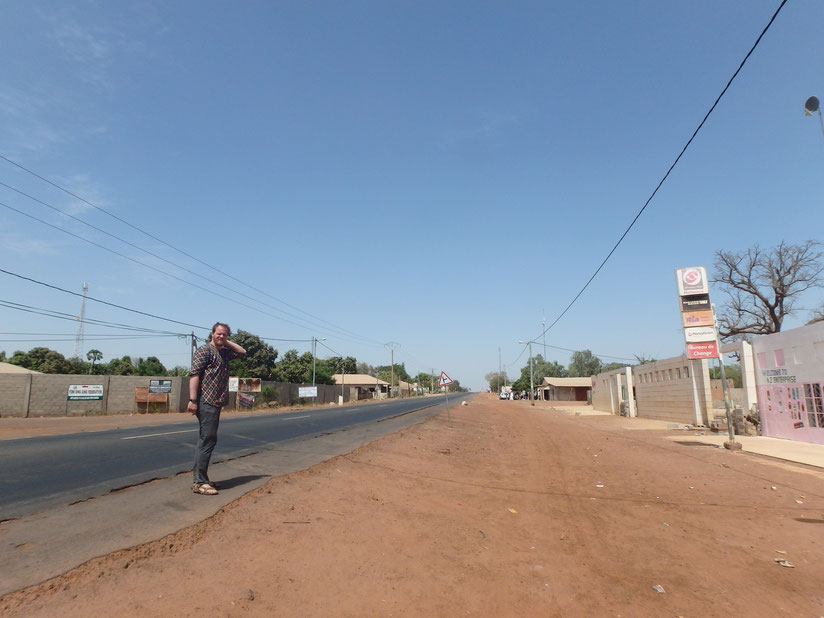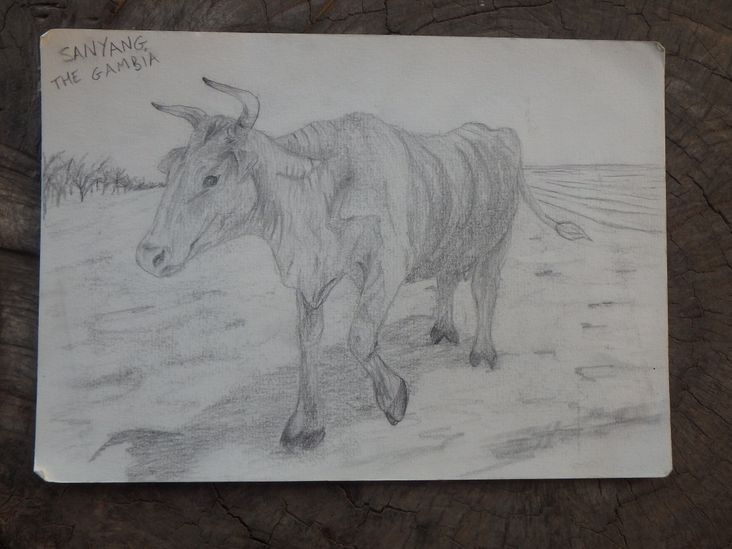
My partner Dan and I were backpacking around The Gambia and Senegal for six weeks. This is the information I was looking for before we left...
Unless (like us) you are carting around bodyboards or other specialised equipment, there is no reason why you can't fit all your luggage into a "day pack", hand-luggage sized bag. The warm
weather means you can usually wash and dry things within a few hours, but if you do find you need more clothes, a visit to a fabric shop and tailor is fun and affordable (between three and ten
pounds for a shirt in The Gambia) and second hand clothes markets are common. Almost anything broken can be fixed, so make sure you ask around before throwing stuff away.

Clothing
Both The Gambia and Senegal are conservative, predominantly Muslim countries. Away from beaches and pools, backpackers should always dress modestly. Cotton or natural fibres are always preferable in the heat and do not bring anything white if you want it to stay that way.
I am sorry to be gender specific, but clothing style in Gambian and Senegalese society is distinctly divided.
For Men...
- Lightweight, breathable trousers x 2
- Long Shorts x 1
- Swimming shorts x 1 (could be interchangeable with shorts).
- Casual cotton shirt x 1 (button/zip top pocket would be ideal).
- T-shirts x 2
- Underwear x 5/6
- Socks lightweight x 3, thicker (for insects) x 1
- Thin jumper/sweater/light jacket x 1
- Trainers/light-weight shoes x 1
- Very comfortable sandals or maybe flip-flops x 1
- Casual, wearable sun hat.
- In the wet season (June to October) add a light-weight rain jacket.

For Women...
- Loose fitting, breathable trousers x 1 - mine are pure cotton and I loved wearing them.
- Long, soft, cotton skirt or dress x 1.
- Leggings x 1 - for insects or extra modesty.
- Swimming costume and shorts (possibly shorts are not necessary, but I usually felt more comfortable wearing them).
- Tunic top/dress (covering bum, shoulders and upper arms) x 1/2 - this can be worn as a modest top with trousers/skirt or a cover-up on the beach.
- T-shirts x 1/2
- Long sleeved cotton shirt (button top pocket would be good) x 1 - for bugs, sun protection and modesty.
- Underwear x 5/6
- Bra/crop tops (whatever you prefer) x 2
- Socks - lightweight x 3, thicker (for insects) x 1
- Trainers/light-weight shoes x 1
- Very comfortable sandals or maybe flip-flops x 1
- Sun hat (I didn't take one but you should).
- In the wet season (June to October) add a light-weight rain jacket.
- Away from cities, it can be a challenge to find period protection, so be sure to take whatever type you prefer (a cup or other reusable items save space and waste).

More importantly...
(In decreasing order of necessity)
- Any prescription drugs you need.
- Malaria medicine.
- First aid kit including usual essentials plus antiseptic cream, painkillers, antihistamine tablets (for bad bug bites and other reactions) and maybe some diarrhoea medicine.
- Bug repellent.
- Sun-cream.
- Money belt (to be worn under clothes) and possibly 2nd money belt/hiding place (Gambian money takes up a lot of space).
- Water purifying devise (we did not have this, but sorely wished we did). Not an advert from me, just a blogger review I trust.
- Small cross-body bag or other way of carrying valuables (camera, phone and purse). In cities Dan had two wallets stolen out of his pockets without him noticing...
- Torch (for frequent power cuts).
- Small knife (for mangoes).
- Plug adaptor (Gambia is on UK sockets and Senegal is on European sockets).
- Unlocked phone and charger (it can be useful to buy a local sim card, but it is usually only possible in big cities. Try Africel network in Gambia and Orange in Senegal).
- Guide book/s - as a first time in West Africa, we found the Gambia Bradt Guide invaluable (you can also go it alone, but be aware that wifi can be difficult to find and phone reception is patchy even with a local sim).
- Toothbrush, toothpaste, soap etc (don't over-pack unless you have special products as standard toiletries can be easily replaced).
- Small power bank.
- Small compass (could be useful, but not usually essential as it is easy to ask directions).
- Notepad, pencil, sharpener (or use knife) and rubber - good for noting down names, phone numbers, place names etc without a phone.
- Very strong needle and thread/dental floss for the emergency fixing of bags, shoes etc. Normal sewing can be done quickly and cheaply by a tailor almost anywhere and other things can be fixed by a specialist in bigger towns (ask around).
- Sunglasses - I never wore mine, but you might want them on the beach. They always felt a little showy for me.
- A lunch box, cutlery and tote bags can save on plastic packaging, but they are also easy to find once you get there if you don't have your favourites already.

I also took...
- Camera, charger, memory cards and spare battery (fully charged).
- Netbook, charger, case and memory card adaptor.
- Drawing pad, water-colour paints and pencils (for making thank-you cards/drawing cows).

It would be nice to have...
- Photos of your family/landscape around home (though not photos of your massive house as it will seem obnoxious).
To check/prepare before you leave:
(in order of timescale leading to departure)
- Learn a few useful phrases/greetings in predominant language of where you will arrive - more than likely you will have to do this as you go along instead, but at least try "Salam malekum." and "Malekum salam." (roughly "Peace be upon you."/"Peach be returned to you.").
- Check visa/entry requirements for your nationality and the length of stay allowed.
- Check passport is valid for time period and some months beyond.
- Check bank card is valid for time period and ensure you have more than one (consider an additional emergency credit card if you only have one bank card).
- Go to doctor/clinic to check what injections you might need and timescale of how long before departure you need them. Ensure you have a yellow fever certificate. Some doctors will prescribe food-poisoning type antibiotics "just in case" if you ask them.
- Book flight tickets.
- Sort travel insurance.
- Arrange travel to airport.
- Book first few nights accommodation and work out how to get there (some places will arrange pick-up which is the least nerve-wracking way to arrive).
- Inform your bank.
- Withdraw some pounds/euros (The Gambia/Senegal) to keep for exchanging (around £200 per person seems sensible).
- Send copies of passports and other important documents to yourself and trusted friend/family at home. Save a copy onto your phone, laptop or a photo in your camera.
- Back up any files/photos on your devises.
- Fully charge all your electronics.
- Download offline maps? I have never done this, but it might have been useful.

What it was actually like to backpack around The Gambia and Senegal: